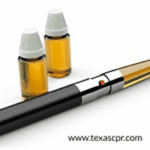
eCigarettes and Risks
When I set out to write about vaping, I had no idea what a can of worms I would be opening. What I’ve found generally, is that non-smokers and ex-smokers hate e-cigarettes and regard them as just as bad or worse than cigarette smoking. On the other hand, people who use them (also known as vaporizing), either don’t know what they are inhaling or have researched and found it to be a safer alternative to smoking.
As luck would have it, I found a new e-cigarette (vape) store in North Dallas (White Horse Vape) and just happened to be there when the ‘guru’ of the vaping world, John Green was there. John was interviewed on television during the national FDA legislation on e-cigarette use, and he holds vaping contests (yes, they really have them) and attends conventions worldwide.
One thing I liked about this store is that their nicotine to go in liquids is fruit and vegetable derived, not from tobacco. Also, White Horse Vape liquids contain no sugar, unlike most others. Erika Fuentes, who works at White Horse Vape also said they use natural extracts in their liquids, including extract from Spanish guava.
“We use nicotine and salt, and you get more power from it,” said John. “It helps people quit cigarettes easier as it is most like a cigarette satisfaction.”
What exactly is in e-cigarettes?
So what exactly is in e-cigarette liquid? Well, a mixture of vegetable glycerin (a natural occurring substance in fruits) and propylene glycol (which is found in many foods and body care products. Then the flavoring is added and your specified amount of nicotine. John said if you could add flavoring to fog, it would be the same as vaping.
There have been studies done, with conflicting results, on the safety and efficacy of vaping being used to help people stop smoking cigarettes.
Researchers at University College London found levels of cancer-causing toxins fell by up to 97 per cent in vapers six months after they switched from cigarettes. But those who continued to use both saw no benefit. The study of 181 people found using the devices was as beneficial for health as taking up nicotine replacement therapy.
However, a study by experts in America compared 23 vapers, who used the devices every day for a year, with 19 people who didn’t smoke. All those taking part were aged between 21 and 45 years old.
The findings published in JAMA Cardiology found vapers were more likely to show signs of two key heart risk factors, which are known to lead to heart disease. Those changes were increased cardiac sympathetic activity – or increased levels of the hormone adrenaline in the heart – and increased oxidative stress.
However, Sarah Williams, director of policy at health charity Action on Smoking and Health (UK), said it can be difficult to draw firm conclusions from such a small study.
But, she added: “There is general agreement that smoking is far more dangerous than using e-cigarettes.”[i]
It is important to note that nicotine is a toxin to the body and does constrict blood vessels, which can cause heart disease and even stroke. So even though e-cigarette liquid does not contain the 4,000 chemicals (including carpet glue) and more than 50 carcinogens that cigarettes do, people who vape are still at risk for the side effects of nicotine.
However, for those who are serious about stopping nicotine altogether, the e-cigarette juices come with varying amounts of nicotine, down to 1.5mg and even 0mg.
One concern I had heard about was a condition called “popcorn lung” associated with vaping. However, John was able to give insight on this. He said this condition is caused when someone who vapes also smokes cigarettes.
“The vapor from e-liquid actually moistens and pulls the build-up of tar from your lungs,” John said. “When you smoke cigarettes and vape, the vapor pulls the tar away, but the cigarette smoke binds it in your lungs into small balls.”
He said the worst thing you can do is vape and smoke cigarettes.
Both John and Erika did say that some of the benefits they’ve found by vaping instead of smoking cigarettes is being able to breathe easier and not smelling of cigarettes.
This is how the Texas legislature defines e-cigarettes and liquids as: Adds tobacco substitute or tobacco products to definition of tobacco products prohibited for minors under 18. Defines e-cigarettes specifically as an item prohibited for minors under 18. (Signed by governor 5/28/15) http://www.statutes.legis.state.tx.us/Docs/HS/htm/HS.161.htm#161.252
